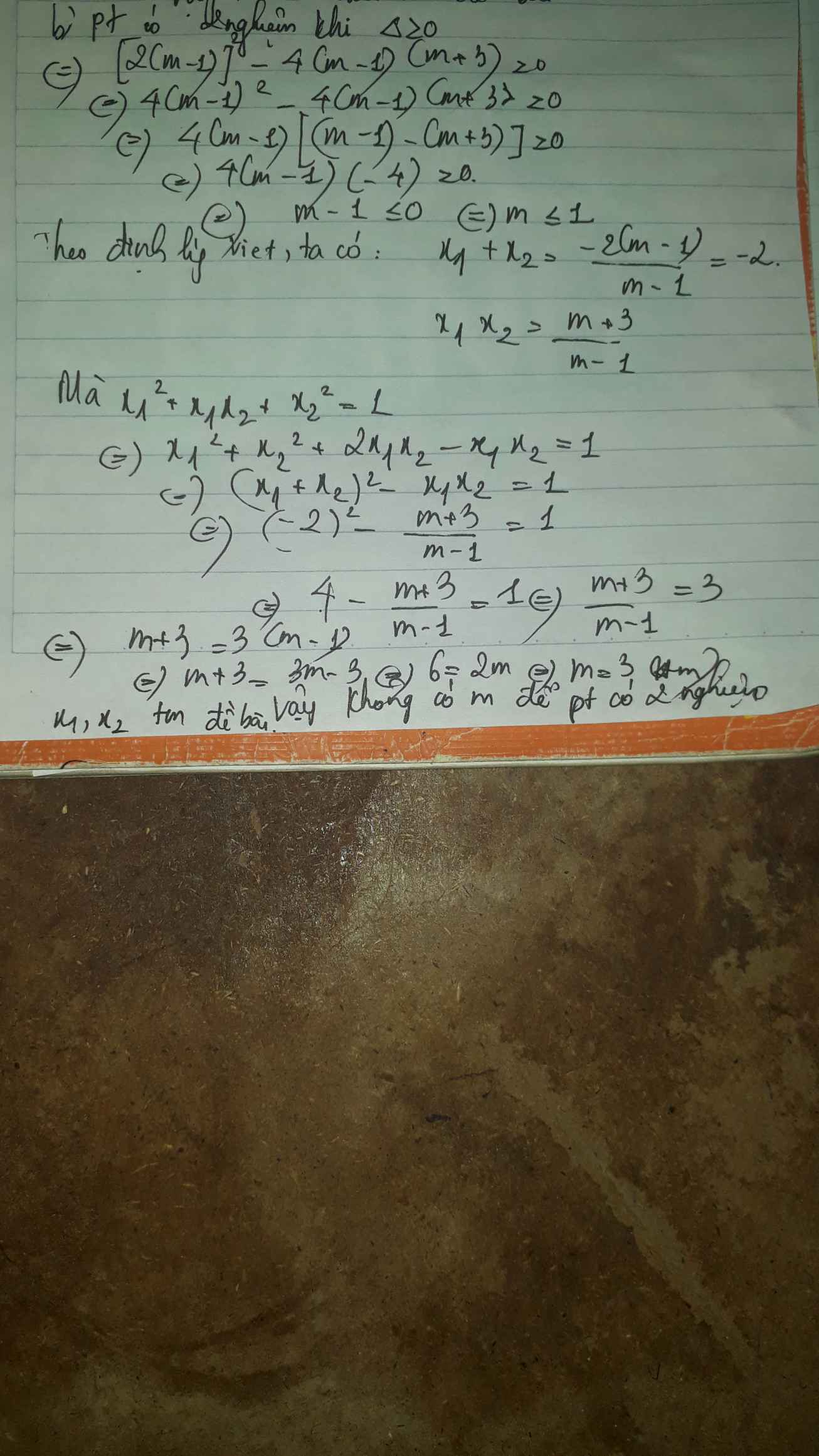Hãy nhập câu hỏi của bạn vào đây, nếu là tài khoản VIP, bạn sẽ được ưu tiên trả lời.

a: Khi m=-1 thì pt sẽ là \(x^2-\left(-1+2\right)x-\left(-1\right)-3=0\)
\(\Leftrightarrow x^2-x-2=0\)
=>x=2 hoặc x=-1
b: \(\Delta=\left(m+2\right)^2-4\left(-m-3\right)\)
\(=m^2+4m+4+4m+12\)
\(=m^2+8m+16=\left(m+4\right)^2\)
=>Phương trình luôn có hai nghiệm
Theo đề, ta có: \(\left(x_1+x_2\right)^2-2x_1x_2>1\)
\(\Leftrightarrow\left(m+2\right)^2-2\left(-m-3\right)>1\)
\(\Leftrightarrow m^2+4m+4+2m+6-1>0\)
\(\Leftrightarrow\left(m+3\right)^2>0\)
=>m<>-3

a: Thay m=3 vào pt, ta được:
\(x^2-4x-1=0\)
\(\Leftrightarrow\left(x-2\right)^2=5\)
hay \(\left[{}\begin{matrix}x=\sqrt{5}+2\\x=-\sqrt{5}+2\end{matrix}\right.\)
b: \(\text{Δ}=\left(-4\right)^2-4\left(-2m+5\right)\)
\(=16+8m-20=8m-4\)
Để phương trình có hai nghiệm thì 8m-4>=0
hay m>=1/2
Theo đề, ta có: \(\left(x_1+x_2\right)^2+3x_1x_2-3\left(x_1+x_2\right)=0\)
\(\Leftrightarrow4^2-3\cdot4+3\left(-2m+5\right)=0\)
\(\Leftrightarrow4-6m+15=0\)
=>-6m+19=0
hay m=19/6(nhận)

1,
Thay m=4 phuong trình đã cho trở thành : \(x^2-9x+20=0\)
\(\Delta=81-80=1\) \(>0\) nên phương trình đã cho có hai nghiệm phân biệt \(x_1=5\) và \(x_2=4\).
2,
Ta có \(\Delta=\left(2m+1\right)^2-4\left(m^2+m\right)=1>0\) với mọi \(m\) nên phuong trình đã cho có hai nghiệm phân biệt
\(x_1,x_2\) với mọi \(m.\)
Áp dụng định lý Vi-et : \(\hept{\begin{cases}x_1+x_2=2m+1\\x_1x_2=m^2+m\end{cases}}\)
\(\Rightarrow x_1^2+x_2^2-5x_1x_2=-17\) \(\Leftrightarrow\left(x_1+x_2\right)^2-7x_1x=-17\Leftrightarrow\left(2m+1\right)^2-7\left(m^2+m\right)=-17\Leftrightarrow m^2+m-6=0\)
\(\Rightarrow\hept{\begin{cases}m=-3\\m=2\end{cases}}\)

Ta có: \(\Delta=\left(m-4\right)^2-4m.2m=m^2-8m+16-8m^2=-7m^2-8m+16\)
Để phương trình có nghiệm thì \(\Delta>0\Rightarrow\dfrac{-4-8\sqrt{2}}{7}< x< \dfrac{-4+8\sqrt{2}}{7}\)
Áp dụng định lý Vi-et ta có:
\(x_1+x_2=\dfrac{\left(m-4\right)}{m};x_1.x_2=2\) (1)
Mặt khác ta lại có: \(2\left(x_1^2+x_2^2\right)-5x_1x_2=0\\ \Rightarrow2\left(x_1+x_2\right)^2-7x_1x_2=0\)(2)
Thay (1) vào (2) ta được
\(2\left(\dfrac{m-4}{m}\right)^2-7.2=0\)
\(\Rightarrow\left[{}\begin{matrix}m=\dfrac{4}{1-\sqrt{7}}\\m=\dfrac{4}{1+\sqrt{7}}\end{matrix}\right.\) (Loại)
Do đó không có giá trị m thỏa mãn

a: \(\Leftrightarrow\left(2m+2\right)^2-4m^2>=0\)
=>8m+4>=0
hay m>=-1/2
b: \(\Leftrightarrow\left(x_1+x_2\right)^2-7x_1x_2=13\)
\(\Leftrightarrow\left(-2m-2\right)^2-7m^2=13\)
\(\Leftrightarrow4m^2+8m+4-7m^2-13=0\)
\(\Leftrightarrow-3m^2+8m-9=0\)
\(\text{Δ}=8^2-4\cdot\left(-3\right)\cdot\left(-9\right)=64-4\cdot27< 0\)
Vậy: Phương trình vô nghiệm

b) phương trình có 2 nghiệm \(\Leftrightarrow\Delta'\ge0\)
\(\Leftrightarrow\left(m-1\right)^2-\left(m-1\right)\left(m+3\right)\ge0\)
\(\Leftrightarrow m^2-2m+1-m^2-3m+m+3\ge0\)
\(\Leftrightarrow-4m+4\ge0\)
\(\Leftrightarrow m\le1\)
Ta có: \(x_1^2+x_1x_2+x_2^2=1\)
\(\Leftrightarrow\left(x_1+x_2\right)^2-2x_1x_2=1\)
Theo viet: \(\left\{{}\begin{matrix}x_1+x_2=-\dfrac{b}{a}=2\left(m-1\right)\\x_1x_2=\dfrac{c}{a}=m+3\end{matrix}\right.\)
\(\Leftrightarrow\left[-2\left(m-1\right)^2\right]-2\left(m+3\right)=1\)
\(\Leftrightarrow4m^2-8m+4-2m-6-1=0\)
\(\Leftrightarrow4m^2-10m-3=0\)
\(\Leftrightarrow\left[{}\begin{matrix}m_1=\dfrac{5+\sqrt{37}}{4}\left(ktm\right)\\m_2=\dfrac{5-\sqrt{37}}{4}\left(tm\right)\end{matrix}\right.\Rightarrow m=\dfrac{5-\sqrt{37}}{4}\)

\(\Delta'=\left(m-1\right)^2+2m=m^2+1>0;\forall m\)
\(\Rightarrow\) Pt luôn có 2 nghiệm pb với mọi m
Theo hệ thức Viet: \(\left\{{}\begin{matrix}x_1+x_2=2\left(m-1\right)\\x_1x_2=-2m\end{matrix}\right.\)
Cộng vế với vế: \(x_1x_2+x_1+x_2=-2\) (1)
\(x_1^2+x_1-x_2=5-2m\)
\(\Leftrightarrow x_1^2+x_1-x_2=5+x_1x_2\) (2)
Cộng vế với vế (1) và (2):
\(\Rightarrow x_1^2+2x_1=3\)
\(\Leftrightarrow x_1^2+2x_1-3=0\Rightarrow\left[{}\begin{matrix}x_1=1\Rightarrow x_2=-\dfrac{3}{2}\\x_1=-3\Rightarrow x_2=-\dfrac{1}{2}\end{matrix}\right.\) (thế \(x_1\) vào (1) để tính ra \(x_2\))
Thế vào \(x_1x_2=-2m\Rightarrow m=-\dfrac{x_1x_2}{2}\Rightarrow m=\pm\dfrac{3}{4}\)

a: \(\Delta=\left(2m-2\right)^2-4\left(-m-3\right)\)
\(=4m^2-8m+4+4m+12\)
\(=4m^2-4m+16\)
\(=\left(2m-1\right)^2+15>0\)
Do đó: Phương trình luôn có hai nghiệm phân biệt
b: Theo đề, ta có:
\(\left(x_1+x_2\right)^2-2x_1x_2>=10\)
\(\Leftrightarrow\left(2m-2\right)^2-2\left(-m-3\right)>=10\)
\(\Leftrightarrow4m^2-8m+4+2m+6-10>=0\)
\(\Leftrightarrow4m^2-6m>=0\)
=>m<=0 hoặc m>=3/2



\(x^2+2\left(m+1\right)x+m^2=0\left(1\right)\)
\(a,m=1\Rightarrow\left(1\right)\Leftrightarrow x^2+4x+1=0\Leftrightarrow x=-2\pm\sqrt{3}\)
\(b,\Delta'\ge0\Leftrightarrow\left(m+1\right)^2-m^2\ge0\Leftrightarrow m\ge-\dfrac{1}{2}\)
\(\Rightarrow\left\{{}\begin{matrix}x1+x2=-2\left(m+1\right)\\x1x2=m^2\end{matrix}\right.\)
\(x1^2+x2^2-5x1x2=13\Leftrightarrow\left(x1+x2\right)^2-7x1x2=13\Leftrightarrow4\left(m+1\right)^2-7m^2-13=0\Leftrightarrow-3m^2+8m-9=0\left(vô-nghiệm\right)\Rightarrow m\in\phi\)
a: Khi m=1 thì pt sẽ là: \(x^2+2x+1=0\)
hay x=-1
b: \(\text{Δ}=\left(2m+2\right)^2-4m^2=4m^2+8m+4-4m^2=8m+4\)
Để phương trình có hai nghiệm thì 8m+4>=0
hay m>=-1/2
Theo đề, ta có: \(\left(x_1+x_2\right)^2-7x_1x_2=13\)
\(\Leftrightarrow\left(2m+2\right)^2-7m^2=13\)
\(\Leftrightarrow-3m^2+8m-9=0\)
\(\Leftrightarrow3x^2-8m+9=0\)
\(\text{Δ}=\left(-8\right)^2-4\cdot3\cdot9< 0\)
Do đó: Không có giá trị nào m thỏa mãn